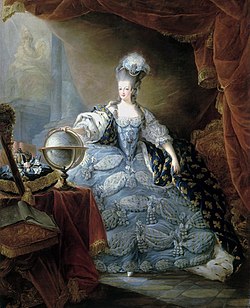 Marie Antoinette, the last Queen of France prior to the French Revolution | |
| Pronunciation | French: [maʁi] Czech: [ˈmarɪjɛ] English: /mæˈriː,məˈriː/ |
|---|---|
| Gender | Female |
| Origin | |
| Word/name | Biblical Hebrew, via Syro-Aramaic, Greek, Latin |
| Other names | |
| Related names | Maree, Maarja, Máire, Marié, Maria, Mariah, Mary, Elmarie |
Marie is a variation of the feminine given name Maria.
Contents
- Compound names
- Feminine
- Masculine
- Notable people named Marie
- Royalty
- Other
- Fictional characters
- See also
It is also the standard form of the name in Czech, and is also used, either as a variant of Mary or Maria or a borrowing from French, in Danish, English, German, Norwegian, and Swedish.
Marie, Marié or Mariê (真理絵、万里絵、麻里絵、まりえ、マリエ) is also a feminine Japanese given name.